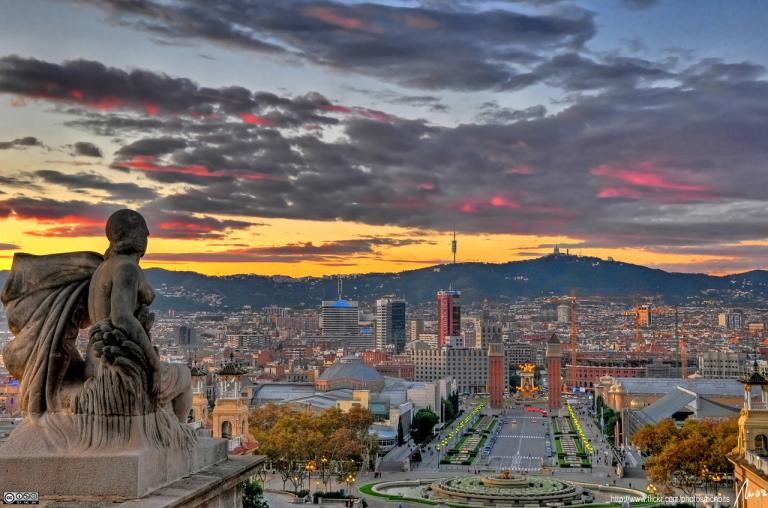A version of this post was originally published on the website of the Center for Public Integrity and is reposted on Grist with CPI’s kind permission.
—–
It is said that borders don’t matter to the atmosphere — all nations have to work together to tackle the problem of climate change.
 But the forces that seek to block that effort likewise know no national boundaries. They’re rallying coal miners in Appalachia, stirring up aluminum workers in Australia, and slowing renewable energy in China. They’re using their exalted position in Indian society to discourage the government from making international commitments. In Brazil, they’re not giving up free rein over rainforest land without a fight.
But the forces that seek to block that effort likewise know no national boundaries. They’re rallying coal miners in Appalachia, stirring up aluminum workers in Australia, and slowing renewable energy in China. They’re using their exalted position in Indian society to discourage the government from making international commitments. In Brazil, they’re not giving up free rein over rainforest land without a fight.
Their handiwork will be evident as negotiators from 192 nations gather in Copenhagen this December to forge the most important environmental treaty ever. There is no question negotiators face a daunting task: to reduce the pollution from the burning of oil, coal, and gas that has fueled economic development since the Industrial Revolution. But their difficult job has been made overwhelming by the tactics wielded the world over by powers rooted in the economy of the past.
In the United States, there has been the well-orchestrated rallying of “grassroots” opposition to climate legislation. Coal millionaire Don Blankenship, chief executive of Massey Energy, is an outlier in the public debate as a vigorous global warming denier. But his message at a West Virginia rally he organized, that “environmental extremists and corporate America are both trying to destroy your jobs,” is a real factor on Capitol Hill. The Senate bill now in play has no hope of passage without winning votes in the economically struggling coal states and coal-dependent industrial Midwestern states.
The message is strikingly similar in an Australian port town known both as a gateway to the Great Barrier Reef and a smokestack industry haven. Russian aluminum billionaire Oleg Deripaska, with a big stake in a refinery there, has lobbyists battling that nation’s climate change plan as “destructive for jobs, destructive for new and existing investment.” Such arguments helped defeat climate legislation in the Australia in August. The business lobby has to be strong to slow climate policy in the hottest and driest inhabited continent, amid a years-long drought that contributed to deadly wildfires while it watches its climate-stressed tourism jewel, the Great Barrier Reef, on course to be “functionally extinct.”
Pressure from old-line business interests may be more transparent in the United States and Australia, but forces also are determined to put on the brakes in the developing world. In China, for instance, wind turbines rising against Xinjian Province mountains have become an iconic image of a growing clean energy commitment. The government’s goal is to achieve 20 percent renewable power by 2020, on the road to which it has doubled its installed wind power in each of the past four years. But China is also building coal plants so fast that it still gets just 1 percent of electricity from wind. Only one of the top 10 power companies-all state-owned enterprises-will meet the government’s interim goal of 3 percent renewables by 2010. The power company executives, all quasi-governmental officials, have resisted proposals to help renewables by raising the price of coal. “There don’t need to be ‘lobbyists’ when discussions can happen directly through the Party,” says Beijing-based political commentator Zhao Jing.
The approach is less subtle elsewhere. For example, Brazilian President Luiz Inacio Lula da Silva recently offered to reduce the pace of deforestation in the Amazon rainforest — one of the world’s most important natural absorbers of carbon dioxide — by 80 percent by 2020. But Carlos Minc, Lula’s environment minister, has faced an onslaught from the agriculture industry and its allies in elected office who balk at curbs on land use. One governor even threatened him with rape. “Many of those industries talk about zero deforestation, but when we press them they want to kill us,” he says. “They call me to speak in the Senate or the House and I stay for five hours under a massacre. They’re favorable to zero deforestation, provided it doesn’t affect … their own land.”
The 1997 Kyoto treaty on climate change was marked by the decision that developing countries, where millions of people still lived without electricity, would not have binding obligations to reduce emissions. The burden of making cuts would fall first, instead, on the countries that grew wealthy in fossil-fueled economies. But the way Kyoto dealt with the rich-poor divide remains a political stumbling block in the United States. And since the International Energy Agency projects that 97 percent of the increase in global emissions between now and 2030 will come from developing countries, hopes have been high that negotiators of the successor treaty at Copenhagen would find a new way to bridge the gap between past and future engines of the climate problem.
But the principle that developing countries shouldn’t have binding treaty obligations is dearly held by businesses that have the ear of government in those nations. In Delhi, India, Bharat Wakhlu, resident director of the powerful Tata Group — that nation’s largest business conglomerate with nearly 100 companies from power generation to autos — says the company recognizes it has a role in addressing global warming. But, he added, “We believe in a ‘common but differentiated’ approach, as we have to retain our competitiveness as well as ensure the planet is safe.” In United Nations climate change lingo, “common but differentiated” is a shorthand reference to just one key differentiation — only wealthy nations have obligations.
Juan C. Mata Sandoval, Mexico’s top climate official and a negotiator for Copenhagen, is frank that one of the business lobby’s chief concerns has been that his nation remain a “non-Annex 1” country-one without required emissions cuts. “We need to communicate with them constantly,” he said. “The private sector also wants a voice and an opinion on how much is Mexico going to put on the table.”
But in its own way, Mexico-like China, India, and Brazil — is addressing climate change. Mexico has a national climate change plan with 86 specific goals it says will slow the growth of its carbon emissions. In absolute terms, Mexico’s carbon output would still rise in the short term, but the country also has mapped out a long-term pathway to reduce its emissions-if it receives technical and financial support from developed countries.
Many see these types of developments as cause for optimism, even while conventional wisdom says the Copenhagen talks are on a path toward stalemate. “All the major economies are prepared to lay down significant low-carbon development plans,” U.S. climate negotiator Todd Stern said at a recent U.S.-India energy forum in Washington. “This is big news. It’s never happened before. It’s important stuff.”
But that headline hasn’t registered. Instead, the prevailing view is much more likely to be that of Brian Flannery, climate guru for energy giant ExxonMobil. “The only way to get to these low [emissions] levels is for the whole world to act together with common targets and a common carbon price,” he said in an interview at run-up negotiations in Bangkok in October, where he was a registered observer for the International Chamber of Commerce. “We’re not going to have everyone with the same target, the same price on carbon … It does raise fundamental questions about whether the negotiating process should aspire to unachievable targets and work in an area of confrontation and dismay, or try to work towards achievable targets.”
It’s hard to tell how much lower the targets need to go for fossil-fuel stalwarts. No developed country has set an unconditional goal of reducing emissions 25 to 40 percent below 1990 levels by 2020 — the short-term target the U.N.-backed Intergovernmental Panel on Climate Change said would be necessary to achieve stabilization.
Given the power of industry lobbying, advocates for climate progress see their best hope as the growing number of businesses that support action. Dan Reicher, director of energy initiatives at Google, who was a member of President Barack Obama’s transition team, is confident a plan can gain support in the U.S. Congress, if it has plenty of business flexibility and opportunity. But he is under no illusions it will be easy. At a recent conference in Washington on energy efficiency — a pursuit Google aims to advance by providing people real-time home electricity information — Reicher summed up the climate change politics succinctly: “This is going to be an epic, epic struggle.”
This story is part of The Global Climate Change Lobby, a project by the International Consortium of Investigative Journalists. ICIJ correspondents Christina Larson in Beijing, Fernando Rodrigues and Marcelo Soares in Sao Paulo, Marian Wilkinson in Sydney, and Kate Willson in Bangkok contributed to this report.




